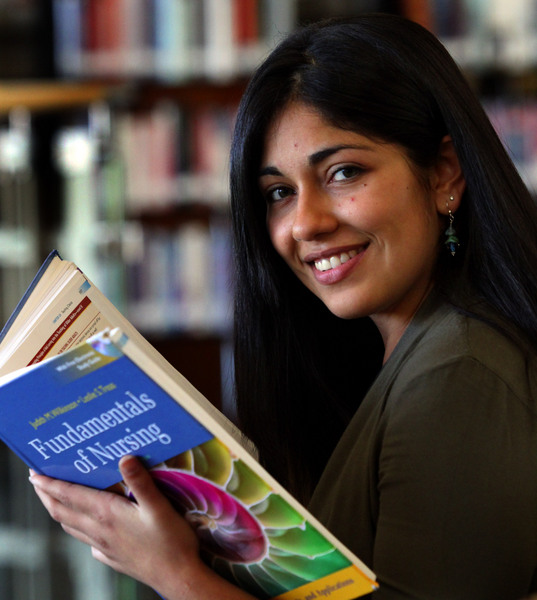By KATIE WATTS / Petaluma Towns Correspondent
“When you’re helping yourself,” said Gabriela Salinas, “there are always people willing to help you.”
Salinas, 24, is working toward a degree as a Registered Nurse. To many, this may not seem remarkable. In their world, it’s what one does — high school, college, degree, job. But none of these were talked about in Salinas’ home.
“I come from a big family,” she said. “Neither of my parents went to college; it was never a topic. Our heritage is Mexican. The boys would start working and start families. My sister and I were expected to get married. College was not something we considered.”
So where did her dream come from?
In third grade, she said, a teacher’s assistant was doing a class project and asked, “‘What do you want to be when you’re older?’ I said, ‘I want to be a doctor.’”
She paused, then added with a smile, “Little things like that can have an influence.”
Fast forward to Casa Grande High School where Salinas, 15, was taking Lynne Moquete’s class in Human Interaction.
“When I met Lynne, I wasn’t the greatest straight-A student. But she cares so much about her students, she’s always there for you,” Salinas said.
As a former Peace Corps volunteer, one of the things Moquete does is spearhead a yearly trip to the Dominican Republic. The trips, Moquete said, have positively changed so many lives, including Salinas’.
“It was an eye-opener,” Salinas remembers. “Life there is so different. You become grateful you have the basics: a family, a roof, running water, food on the table. You don’t care as much if you don’t have extra-stylish shoes. And you start wondering not only how can I help them, but how can I help my community?”
Also, she said, there was “Lynne’s happy radiation. From it, we become our own radiation, and that goes out to the people around me, drawing on positive energy and being grateful for the little things.”
Her other inspiration in high school was her counselor, Darryl Yagi. “He introduced me to a lot of programs, including a college-bound program involved with Sonoma State. He exposed me to education, made me aware that I could go to college, could get the grades.
“There was no one close to me who said, ‘You should go to college,’ no family, no relatives.”
In her senior year, life for Salinas fell apart. Her parents divorced, and she was moved to Chico. “It was rough,” she admitted, “but the year was pivotal for deciding what to do with my life. I didn’t have my role models (Moquete and Yagi), but they were in my head. I found a way to flip the situation around and make it beautiful. You don’t get anything out of being negative.
“So, at the end of the year, instead of applying to a four-year university, I decided I’d go to the JC. I came back to Petaluma and called Lynne, and she offered to rent me a room.”
To pay her way, Salinas became a caregiver at Adobe House, using her background from high school as an activities assistant at another retirement facility.
“It’s wonderful working with dementia patients,” she said. “You’re involved in their lives. You get attached to them, and their deaths made me appreciate life more. I was 18, and it was life-changing. It made me certain of what I was going to do.”
Only now, she knew, it would be as a nurse and not a doctor because nurses are able to interact much more with their patients. Also as a nurse, Salinas realized she could work in different areas such as hospice, pediatrics or labor and delivery.
Her goal was to save enough money to attend school full-time and have “the experience of being a full-time student.” So she worked four years as a medical assistant before applying and being accepted into nursing school, with a graduation date of 2014.
And yet, while she admits school is demanding and the material challenging, she has taken time out to volunteer through San Rafael’s Canal Alliance Compañeras.
“It means ‘companions,’” she explained. “We help pregnant women who need a companion during their births, provide whatever needs they might have.” Sometimes she helps by translating, for many of the women are Hispanic; other times she guides first-time or single mothers. “They tell me their concerns, and I’m there to educate them.
“It’s great to be there during the birth,” she said. “I love it, the excitement and joy of the mom. It’s always a learning experience.”
Salinas admits the schedule juggling can be tricky, but said, “Why would I not do this? It’s giving back.”

